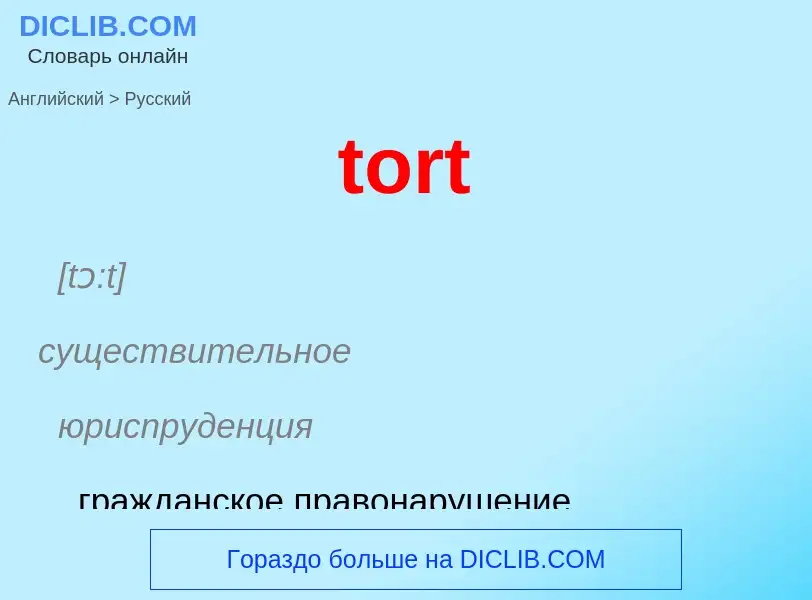Перевод и анализ слов искусственным интеллектом ChatGPT
На этой странице Вы можете получить подробный анализ слова или словосочетания, произведенный с помощью лучшей на сегодняшний день технологии искусственного интеллекта:
- как употребляется слово
- частота употребления
- используется оно чаще в устной или письменной речи
- варианты перевода слова
- примеры употребления (несколько фраз с переводом)
- этимология
TORT - перевод на русский
[tɔ:t]
существительное
юриспруденция
гражданское правонарушение
гражданско-правовой деликт
деликт, гражданское правонарушение
сокращение
[tearing out rotary tools] демонтаж оборудования для роторного бурения
Википедия
A tort is a civil wrong that causes a claimant to suffer loss or harm, resulting in legal liability for the person who commits the tortious act. Tort law can be contrasted with criminal law, which deals with criminal wrongs that are punishable by the state. While criminal law aims to punish individuals who commit crimes, tort law aims to compensate individuals who suffer harm as a result of the actions of others. Some wrongful acts, such as assault and battery, can result in both a civil lawsuit and a criminal prosecution in countries where the civil and criminal legal systems are separate. Tort law may also be contrasted with contract law, which provides civil remedies after breach of a duty that arises from a contract. Obligations in both tort and criminal law are more fundamental and are imposed regardless of whether the parties have a contract.
While tort law in civil law jurisdictions largely derives from Roman law, common law jurisdictions derive their tort law from customary English tort law. In civil law jurisdictions based on civil codes, both contractual and tortious or delictual liability is typically outlined in a civil code based on Roman Law principles. Tort law is referred to as the law of delict in Scots and Roman Dutch law, and resembles tort law in common law jurisdictions in that rules regarding civil liability are established primarily by precedent and theory rather than an exhaustive code. However, like other civil law jurisdictions, the underlying principles are drawn from Roman law. A handful of jurisdictions have codified a mixture of common and civil law jurisprudence either due to their colonial past (e.g. Québec, St Lucia, Mauritius) or due to influence from multiple legal traditions when their civil codes were drafted (e.g. Mainland China, the Philippines, and Thailand). Furthermore, Israel essentially codifies common law provisions on tort.

